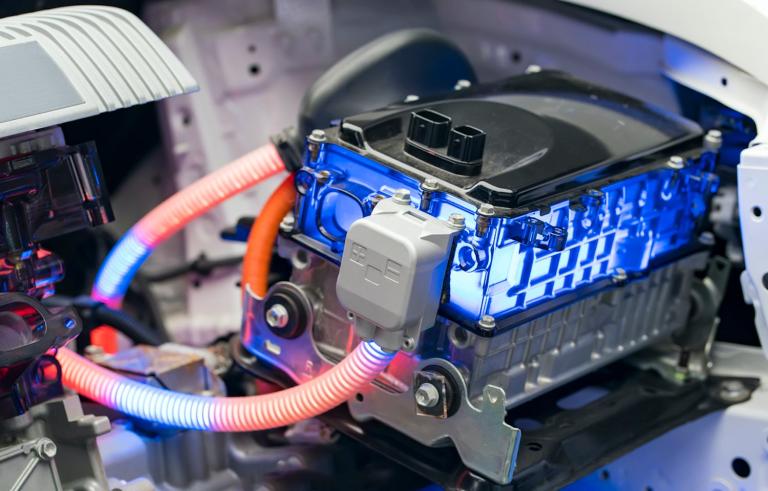Hydrogen fuel vs electric batteries: which is better for EV range?

Electric vehicles (EVs) are powered by two key sustainable technologies—hydrogen fuel and electric batteries. Both are driving the shift toward a lower-carbon future, but their differences might surprise you.
Today's sustainable energy solutions are reshaping the way we think about transportation. Electric vehicles are leading this change.
But when it comes to charging or fueling these vehicles, there are two main options: electric charging stations and hydrogen fueling stations. To emit little to no greenhouse gases and reduce the dependence on fossil fuels, EVs rely on either a plug-in battery or a hydrogen fuel cell to power their engines.
While both technologies have the potential to reduce carbon emissions from transportation, they have important differences that affect their efficiency, range and adoption.

Stay hydrogenated
Hydrogen fuel cells produce electricity by combining hydrogen with oxygen, generating water as the only by-product. One of the biggest advantages of using hydrogen to power EVs is the quick refueling time.
A hydrogen refill takes only a few minutes, similar to filling a traditional gas tank, which boosts convenience for drivers and limits downtime during long trips.
Another benefit is range.
Hydrogen-fueled EVs generally offer greater range than battery-powered alternatives. This makes them particularly suitable for commercial use cases, such as long-haul trucking or cross-country travel, where consistent operation is essential.
Yet hydrogen infrastructure remains a significant barrier.
Availability of hydrogen refueling stations is minimal compared to electric charging infrastructure, especially outside major urban areas. Producing hydrogen often relies on methods that emit significant carbon dioxide, reducing the environmental benefits of this technology.

Read more: The truth about EV battery recycling
Batteries know better
Electric batteries, primarily lithium-ion, power most EVs on the road today. Compared to hydrogen fuel cells, electric vehicles are experiencing broader adoption thanks to their more established infrastructure and greater affordability.
Electric charging stations are expanding rapidly across urban and rural areas. Many governments and private companies are actively investing in this infrastructure, making EV ownership increasingly accessible.
But charging speed remains a challenge.
While some advanced fast-charging outlets can deliver a significant charge in 30 minutes, typical charging still takes several hours. The range of battery-powered EVs, though constantly improving, often remains lower than that of hydrogen fuel cell vehicles.
Yet advancements in battery density promise lighter batteries that store more energy, enabling extended driving distances per charge. This evolution continues to close the gap between electric batteries and hydrogen performance.

Read more: The three eras of digital mapping—so far
Location for innovation
By using real-time data and precise mapping, location technology helps drivers find nearby charging stations efficiently, reducing range anxiety and optimizing route planning for extended trips.
Solutions like HERE EV Routing and HERE EV Charge Points are supporting the growing EV ecosystem. These tools help drivers plan efficient routes that account for charging availability, battery range and travel time, ensuring seamless, stress-free electric vehicle journeys.
For hydrogen-powered vehicles, similar location-based solutions could boost the development of refueling station networks, helping drivers locate the closest hydrogen sources and encouraging widespread adoption.
The combination of precise mapping and reliable navigation can bridge significant gaps in infrastructure, ensuring users of both technologies feel confident about their travel options.

Read more: The case for cleaner trucking
Green by design
Both hydrogen and electric batteries offer environmental benefits compared to conventional internal combustion engines, but their sustainability depends heavily on how the energy they use is produced.
For electric batteries, greener power grids will lower the carbon footprint of charging. Hydrogen production, on the other hand, must transition to renewable-powered electrolysis methods to reduce emissions.
Performance also varies between the two technologies.
Electric batteries are better suited to short commutes, urban travel and residential use, thanks to their accessibility and affordability.
Hydrogen fuel, with its extended range and rapid refueling, shows promising potential for high-demand applications, including heavy-duty transport and long-distance driving.

And the winner is
Although seen as rivals in the race to sustainable fuels, electric batteries and hydrogen fuel cells actually complement each other in meeting different transportation needs.
For instance, electric vehicles could remain the go-to solution for personal use and small fleets, while hydrogen-powered EVs could lead in commercial and industrial contexts.
In either case, collaboration is key. Governments, businesses and technology providers will be crucial in creating a transportation system where drivers benefit from the strengths of both technologies.
With the right support, the vision of clean, efficient and reliable mobility is closer than we might think.
Sign up for our newsletter
Why sign up:
- Latest offers and discounts
- Tailored content delivered weekly
- Exclusive events
- One click to unsubscribe


